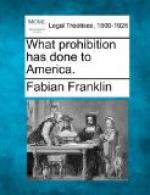CHAPTER VIII
One-half of one per cent.
The Eighteenth Amendment forbids “the manufacture, sale or transportation of intoxicating liquors within, the importation thereof into, or the exportation thereof from the United States and all territory subject to the jurisdiction thereof for beverage purposes.” The Volstead act declares that the phrase “intoxicating liquor,” as used in the act, “shall be construed to include ‘all liquors’ containing one-half of one percentum or more of alcohol by volume which are fit for use for beverage purposes.”
Since everybody knows that a drink containing one-half of one per cent. of alcohol is not in fact an intoxicating drink, a vast amount of indignation has been aroused, among opponents of National Prohibition, by this stretching of the letter of the Amendment. I have to confess that r cannot get excited over this particular phase of the Volstead legislation. There is, to be sure, something offensive about persons who profess to be peculiarly the exponents of high morality being willing to attain a practical end by inserting in a law a definition which declares a thing to be what in fact it is not; but the offense is rather one of form than of really important substance.
The Supreme Court has decided that Congress did not exceed its powers in making this definition of “intoxicating liquor”; and, while this does not absolve the makers of the law of the offense against strict truthfulness, it may rightly be regarded as evidence that the transgression was not of the sort that constituted a substantial usurpation—the assumption by Congress of a power lying beyond the limits of the grant conferred upon it by the Eighteenth Amendment. If Congress chooses to declare one-half of one per cent. as its notion of the kind of liquor beyond which there would occur a transgression of the Eighteenth Article of the Amendments to the Constitution, says the Supreme Court in effect, it may do so in the exercise of the power granted to it “to enforce this Article by appropriate legislation.” Not a little effort has been expended by lawyers and legislators—State and national —upon the idea of bringing about a raising of the permitted percentage to 2.75. That figure appears to represent quite accurately the point at which, as a matter of fact, an alcoholic liquor becomes—in any real and practical sense—in the slightest degree intoxicating. But, except for the purpose of making something like a breach in the outer wall of the great Prohibition fortress—the purpose of showing that the control of the Prohibitionist forces over Congress or a State Legislature is not absolutely unlimited—this game is not worth the candle.




